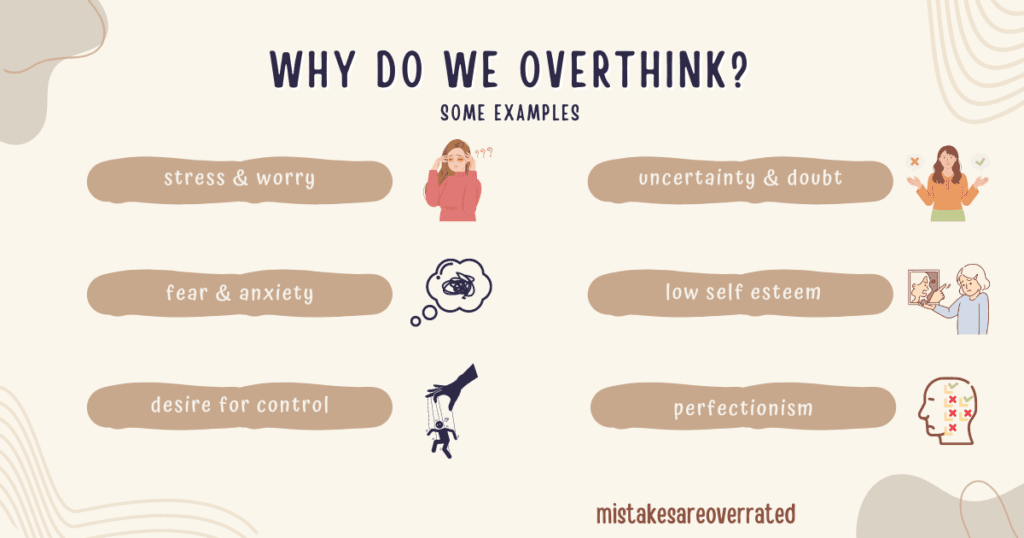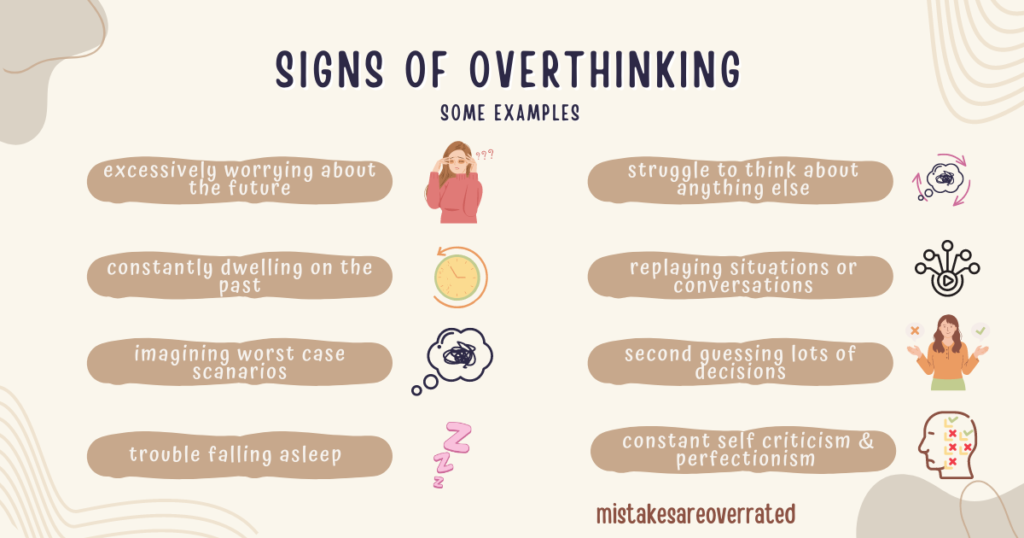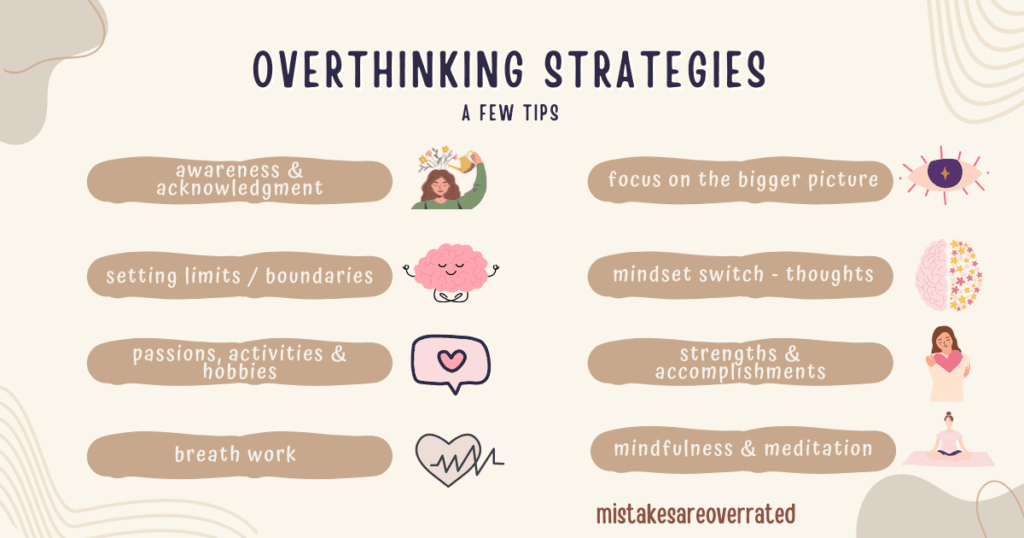do you often imagine worst-case scenarios before a situation?
constantly worry about the decisions you make? or replay situations and conversations in your head?
you deserve to worry less and start living in the present more.
overthinking isn’t the amount of thoughts we have in a day, it’s the feeling like you are stuck in a mental loop fixated on a thought.
this can leave you feeling anxious, exhausted and even paralysed at times, possibly taking a toll on your mental and physical health.
regain control over your thoughts by learning the strategies and steps i found helped me stop overthinking.
overthinking
understanding what overthinking actually is
overthinking isn’t the amount of thoughts we have on a day-to-day basis, as we have approximately 60,000 thoughts a day!
overthinking is when you fixate on certain situations, people, events or problems for farrr too long.
another form is when you find yourself constantly over-analysing particular situations, causing you to deeply worry.
this is different from problem solving or self reflection.
overthinking keeps us in a loop of often unproductive thoughts, or endless contemplation of the problem itself, which can trap us in negativity.
problem solving involves us navigating our way through problems to find solutions, and self reflection is a necessity for our self awareness.
overthinking can lead to sleepless nights and hindered decision making, as you struggle to stop questioning, analysing or replaying scenarios.
this doesn’t help you solve the problem nor move forward from it, in fact it can make things feel more complicated than they really are.
example: you struggle to fall asleep every night for 2 weeks leading up to an event because your brain goes over every worst case scenario.
these types of thoughts are known as maladaptive thoughts.
maladaptive behaviours
maladaptive behaviour patterns are coping strategies our body’s have learnt.
we use them in response to difficult times in our life or when we’re adapting to new situations and change.
it is your body’s way of attempting to relieve some of the excess stress and worry you may be feeling due to this change in your life.
however this sort of behaviour is usually non productive, as it typically results in a short term gain but long term problems.
the word ‘mal’ is a prefix placed before another word.
example: adaptive – maladaptive and functioning – malfunctioning.
the word mal has the power to make words hold negative connotations, infact, “mal” in spanish translates to “bad” and/or “wrong” in english.
on the other hand adaptive behaviour means you are typically okay with change and are able to adjust in different circumstances in life.
you are able to act in a manner where your actions, thoughts, behaviours, and emotions help you cope in new environments.
this allows you to avoid conflict with people around you, whilst still meeting your personal needs and demands.
overthinking can become mentally draining and make you feel as though you cant get on with certain things in your life.
it is important to try to get on top of this destructive thinking pattern as it can cause you to excessively worry and stress.
this can grow and lead to mental health issues (example: anxiety and depression).
why we overthink
i believe almost everyone has worried and overthought at some time in their life as it’s part of the human experience and that is normal.
but when your thoughts and worries begin to endlessly circle in your mind, causing inaction instead of preparing for your next steps – this is overthinking
‘over thinking’ is not a mental illness itself, it’s actually commonly referred to as ‘rumination’.
this is where you are in a deeeeep thought and you are repeatedly thinking and dwelling on a situation or thought over and over and over.
this can be you worrying about your future and what it may hold,
example: your thought “if i don’t get this job my whole future is ruined”
so for 2 weeks leading up to the interview you can’t sleep due to your brain overthinking ,every possible outcome, scenario, question ect.
or it could be ruminating on something in the past.
most people dwell on ‘mistakes’ they have made,
example: comparing theirself to others, not travelling enough, a hard breakup, not learning more in life, career worries, ect ect.

why overthinking happens
overthinking can happen due to many things, but here is what mainly caused me to overthink;
stress, worry, fear and anxiety
sometimes a fear of failure can incite your overthinking, or if you fear making the wrong choice.
if you are an anxious person, this can lead to overthinking patterns and habits, and cause extra stress and worry.
desire for control
sometimes we try and stay in control of the future (possible outcomes), but this can lead to overthinking.
i discovered most of my overthinking stemmed from a need to control outcomes out of my control, or because i feared the unknown future.
uncertainty and doubt
self-doubt and low self esteem can have a huge impact on creating overthinking patterns and habits.
personally, when my self esteem was at its lowest, my overthinking was at its highest.
this was due to me not having confidence nor trust within myself and my abilities.
because of this self-doubt, i overthought everything to try and “prepare” myself for the feared situation i was going into.
perfectionism
when you are stuck in the mindset of trying to make everything perfect, this can lead to excessive overthinking (rumination).
traumas impact on overthinking
people who have experienced trauma may find they are on high alert for danger, hyper vigilant or constantly scan for potential threats.
this constant heightened state of alertness may lead you to overthink possible signs of danger, trouble or harm.
this is your body’s way of anticipating what could go wrong, so it can try to protect you from any harm.
trauma can often lead to a loop of intrusive thoughts that can be triggered by situations or reminders of the trauma.
this happened to me after a traumatic experience, and it took me a long time to try and figure out why my brain did this.
please don’t feel like you’re alone. although i haven’t healed it 100%, i have helped manage it so it doesn’t control my mind anymore.
i have an article on understanding why triggers happen after trauma and strategies that may help you with them.
signs of overthinking
these are some signs you overthink.

please note these are just some examples, they are not limited to these.
- excessively worrying about the future.
- dwelling on your past especially your ‘mistakes’
- imagining worst case scenarios
- trouble falling sleeping
- struggle or unable to think about anything else
- constantly aiming for perfection – being a perfectionism
- replaying situations and conversations.
- second guessing yourself and your decisions
- overly self critical (self criticism)
our brains struggle to translate our overthinking thoughts into positive outcomes, which often prevents us from taking any action.
overthinking has the power to manifest into our physical body and emotions.
it can make your body stressed, which can cause you to feel tight and tense all over.
this can lead to physical symptoms such as sore tight muscles, loss of appetite, headaches and migraines or stomach problems.
or mental symptoms such as anxiety, negative thoughts, tension, inability to relax, procrastination, and exhaustion.
healthy habits to prevent overthinking
i highly highly hiiiighly recommend you create structure so you can establish a routine in your life.
having a routine meant structure and discipline was back into my life and that helped me create a sense of control.
having a sense of control enabled me to create healthy habits through repetition, and this reduced my overthinking drastically.
i incorporated these healthy changes into my daily or weekly routine, and by doing them week after week, they turned into healthy habits.
journaling
oh my goshhh, for me journaling was the best way i was able to express and release my overactive thoughts to clear my mind.
honestly i will never stop talking about journaling because the benefits i found from it in my healing and self improvement journey are profound.
activity
lets get physical, physicalll. after i incorporated physical activity into my daily routine my stress decreased and my peace increased.
my activity changes frequently, however i still participate in physical activity every single day (besides if i’m ill)
example: i aim for 2 physical activities per day. i go on a walk in nature or the coast daily, but my other form switches up
the gym, when it’s season my sport training and games, recently into swimming again, i dance around the house when i clean.
recharge
beauty sleep, breaks and relaxation
i’ve always been a big sleeper, but for a few months it wasn’t a priority to me, and those months my overthinking skyrocketed.
i cannot begin to express the importance of having a good sleep each night, so please just try to focus on it.
i incorporated taking small breaks to reset and recharge my brain for optimal work potential.
it took me a few months to figure out a routine that works best for me (break duration, time, work blocks), but it’s worth it.
mindfulness
i incorporated mindfulness into my daily routine with small changes such as going for my walks without earphones.
i would walk and be present with my surroundings, the sounds around me, and my thoughts.
gratitude
gratitude came naturally to me after a while. i began with writing what i was grateful for in my journal.
i began to express my gratefulness in my thoughts and words whilst being in the moment whenever i felt thankful.
helping others
help others when possible. i have always loved helping others but i incorporated helping others where ever possible into my life.
my soul desires to help people, and i noticed my overthinking patterns became less frequent when i was achieving my desires.
nutrition
i focused heavily and passionately with my nutrition. i ate healing foods, wholefoods and ate when i was hungry and stopped when i was full.
being able to nourish my body with foods that were good for me made my mind clearer and my body happier.
reflection
instead of dwelling, reflect on your past experiences and ‘mistakes’ to learn from them.
this is self reflection, something we touched base on at the beginning of this article.
you must forgive yourself for mistakes made, however i don’t think you should forget about them.
begin to let go of the negative emotions you have attached to these mistakes so you can grow form them.
i have an in-depth article about why you may get triggered after trauma and strategies to try help you.
overthinking strategies

awareness and acknowledgment
become aware and acknowledge your thoughts, as this will help you grow your self awareness.
when i say you need to have self awareness, i mean you need to be able to acknowledge when you’re in a cycle of rumination.
think “oh gosh i’ve been thinking about this for awhile now, i’m doing it again”, take a step back and reflect.
with you thinking “i’m doing it again” you are being self aware by catching yourself out that you’re in your repetitive thinking cycle.
stepping back is that you have acknowledged you’re overthinking and you want to change this thinking pattern.
instead of dismissing your thoughts, take a step back and sit with them so you can reflect and question them.
reflect by thinking about, or writing down (my preference is writing), how these thoughts you were just thinking of are affecting your mood.
how do you feel? what emotions are behind your thoughts? why do you think you are you overthinking?
this way you’re able to unpack your emotions and thoughts onto paper and see them for face value.
sometimes we get so caught up in our thoughts that we don’t realise how these thoughts are making us feel.
our thoughts impact our life just as much as they impact our behaviours, mental and/or physical health.
when you write down:
- what you’re thinking of
- how its making you feel / your emotions
- why you’re ruminating on this thought
- how is this benefiting you
it opens you eyes and widens your perspective to see how detrimental this is for you so you can begin to create steps for action.
set boundaries with your thoughts
i know it is difficult at first, but don’t give up on trying. through repetition and patience i believe you can heal your thinking patterns.
try to limit the amount of time you spend on a certain thought or decision.
set a boundary in advance,
example: “i will give myself 10 minutes to think about this problem, i will try to create a plan to overcome it but if i can’t, i will move on”
this helped me create structure and is was a preventative from spiralling into an endless loop of overthinking.
here is an article about the strategies that helped me learn how to set healthy boundaries after trauma.
when i was learning these exact strategies i’m giving you today, i would to do this –
**overthinking** – oh shoots i am overthinking, can i help this situation or am i just thinking about it? – did the journal exercises to find out.
this grew my awareness.
activities, hobbies and passions
when you’re overwhelmed by your thoughts it may be hard to have the motivation to want to learn or start something new.
but finding something that you enjoy can be so beneficial to the steps of helping you get out of your overthinking mindset.
i don’t like to use the word “distraction” when describing this step.
it’s not so much a distraction for me, instead it’s finding activities i truly enjoy so i can partake and focus on them.
(this is just a personal preference, as i know that distractions can be a healthy and good thing when you use them in a positive way)
for me it was about finding passions, interests and things that make me feel good and powerful.
for me:
- going to my sport training and games
- cooking homemade dinners and trying a new recipe
- reading my books
- spending time with my friends
- drawing doodles and writing poems
- camping
- going to the gym and on walks
breath work
slowly inhale and exhale whilst relaxing your body.
i prefer to have my eyes shut and sitting in a comfortable position, but sometimes we don’t have control over when and where we begin to overthink.
i was really in my head when i was in my sport game. but i can’t just sit down in the middle of a game, so instead, when i was jogging back into position i took deep breathes and shut my eyes, told myself i will be okay and just really focused on getting my breath as slow as i could.
next
–pen and paper
unravel what your thoughts are and see them physically rather than just mentally.
sometimes our brains don’t realise how silly or detrimental our thoughts are until we physically see them laid out infront of us.
next is change: mindset switch – negative to positive –
for me, i know my brain used to think worst case scenarios, so instead of thinking worse case i would think best case.
*disclaimer* please know that these are best case scenarios to make you have belief in yourself and have positive self talk.
please make sure you don’t these best case scenarios as your expectations or standards, because if you don’t achieve them you will most likely feel down and it could cause you to ruminate on them.
mindset switch
this is where you challenge your current thoughts.
replace your current negative thought to a current positive thought.
example: “im going to mess up my speech” to “i will make myself proud by doing my speech”
but that’s not enough as you still have the primary thought of what you were originally overthinking about even though its now positive.
challenge your overthinking by asking yourself if your worries are rational and if you can work on ways to overcome them.
answering the questions in the above exercise helps you dive deeper into your thoughts.
challenging your thoughts can put them into perspective, as most of the time overthinking exaggerates the severity of your situation.
question yourself- “how likely is this is to actually happen?”
bigger picture
look at the bigger picture and focus on what you can control.
think about how these thoughts will affect your life in a year, 5 years or even 10 years from now.
refocus your mind on the aspects you can control (action steps, ect), and let go of what is out of your influence.
create a list of the things within your control and the things that aren’t, then really focus on where you can take action.
gaining perspective and prioritising your more serious challenges can help you feel less overwhelmed and enables you to plan solutions.
strengths and accomplishments
focus on your strengths, successes and accomplishments.
this is practising self compassion.
they don’t need to be massive accomplishments, but rather things that make you proud, or small goals you achieved in the week or month.
when you are in the midst of a deep spiral of thoughts, think about these successes and goals you achieved and write them down.
talk kindly to yourself, just as you would to the closest person to you and remind yourself that you don’t need to be perfect.
it’s a gentle reminder that you are there for yourself throughout your healing journey and you want to grow.
this is creating a positive mindset as you are acknowledging your hard work instead of just pushing them to the side.
little things add up, so you might surprise yourself with your accomplishments if you write down them down every time you overthink.
meditation and mindfulness
mindfulness is a way to help break the cycle of overthinking by bringing you back to awareness in the present moment.
i recommend setting aside a few minutes each day to practice focusing on your breath and not your thoughts.
this is a healthy habit to get into, as it has the ability to turn your attention inward and help clear your cluttered, busy anxious mind.
this can be as little as 5 minutes a day, and you can use one or more meditation techniques.
i encourage you to try a few new meditation techniques until you have found the one that helps your mind quieten and clear the most.
if you struggle to meditate or be able to really get in touch with your body when you do breath work that is completely okay.
some things aren’t going to work for everyone <3
helping others
maybe you can try doing good deeds.
you may prefer to source feeling better and clearing your mind through external sources rather then internal.
try helping people out of the kindness of your heart, without the incentive they’ll do something back.
it took me a very long time to learn how to help myself internally and speak kindly to myself.
this journey is all about consistency.
yes, it will feel strange or even uncomfortable at first to talk kindly to yourself, usually because you have created a habit of negative self talk.
if you put time and effort into practising self compassion every day, even for 5 minutes, it will slowly become second nature to you.
to still be able to feel good within the time you’re learning and practicing self compassion, do something nice for other people.
when you help others it tends to bring you out of your own thoughts circulating around in your head.
when you do something nice for someone else it can help keep negative thoughts out of your head as it feels good to help someone.
not only does it benefit our mental health and well-being, but it also improves our mood, self-esteem and can help reduce stress!!
when you realise you have the power to be able to make someone’s day better, it can help us stay optimistic.
a friend needing a hand moving house? call my friend i haven’t spoken to in awhile? should i tell that girl her hair is beautiful? help that person carry their shopping?
seeking help
if your overthinking is causing you significant distress, disrupting your life, or leading to anxiety or depression, please consider seeking professional help.
sometimes we need help from professionals, and there is nothing wrong with that.
the information in this article today should never replace professional help, so please talk to a trained professional.
the information you are reading today is what helped me, so it won’t necessarily help you the way you need.
start living.
you need to start living.
rumination is not a helpful mindset as they are maladaptive thoughts.
these types of repetitive thoughts can keep you stuck in a negative thinking cycle.
your thoughts have the ability to negatively impact your self esteem and lifestyle choices.
these feelings can sometimes lead you to blame yourself for things in your life that you actually have little to no control of.
so be present in your life.
ground yourself in the moment you’re living in by;
getting outside – nice walk outside along the beach, nature, around the block, and try to notice things you don’t usually look for or sounds you can hear.
unplug and rewind – turn off your tv, your phone and/or your computer.
the amount of time spent on devices is crazyyyy, even with people working full time.
the time you would of spent scrolling on social media, watching a tv show or playing your favourite game – use that time to do an activity.
read, walk, watch the sunset, paint, cook, go out somewhere, knit, scrapbook your favourite memories of the year, literally anything.
this will bring you so much mental clarity and honestly it makes me feel so great, so i really hope it can make you feel good too.
remind yourself of the good you do when you find yourself fixated on the bad.
your mind is truly so so capable of thinking amazing things.
it’s just about teaching ourselves to get out of these habits we have unconsciously formed and constantly growing our minds.
self improvement is so sooo beneficial in life in order for us to continue to learn and grow to reach our potential and be our happiest selves.
i believe you can do good things, so now you need to believe it aswell.
as always if you have any questions please let me know and send me a message or email.
i wish you all the best on your journey <33
-MAO
don’t give trauma the power to control you, you deserve to live how you want. take control of your trauma.
-life advice from one survivor to another
wanting to share your journey?
feel free to write what you are struggling with, what you found helped you on your journey or any thoughts you have.

Leave a Reply